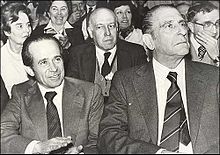Andrés Zaldívar
Andrés Zaldívar Larraín (born March 18, 1936 in Santiago de Chile ) is a Chilean politician .
Life
He was born the son of the railway worker Alberto Zaldívar Errázuriz and Josefina Larraín Tejeda . He had seven brothers, including the later MP Alberto Zaldívar Larraín and the future Senator Adolfo Zaldívar Larraín .
After attending the Instituto Alonso de Ercilla, Hermanos Maristas elementary and secondary school , he began studying law at the University of Chile . He graduated in 1959 with the title of attorney . From 1959 to 1962 he worked for the city of Colina . 1962/1963 he worked as a judge in the municipality of La Cisterna .
As early as 1952 he had joined the Partido Conservador Social Cristiano , in which he also performed management tasks. In 1956 he became secretary of the student organization Unión de Federaciones de Estudiantes Universitarios , and he also took part in the International Student Congress in Chicago for Chile . On July 28, 1957 he participated in the founding of the Partido Demócrata Cristiano de Chile . In the third district of Santiago he took over the presidency of the youth party. In the Chilean presidential elections in 1964, he was involved in the election campaign of Eduardo Frei Montalvas . He played a key role in developing the election program. After Montalva's election, he was State Secretary for Finance from 1964 to 1967. In 1968 he became Chilean Minister for Economy, Development and Reconstruction. At times, his responsibility extended to finance. From 1968 to 1970 he was then Minister of Finance, succeeding Raúl Sáez . At the same time he was also governor of the development bank Banco Interamericano de Desarrollo . He was also a representative of Chile in 1968/1969 in the Inter-American Committee of the Alliance for Progress in Washington, DC and in 1970 at the Economic and Social Committee in Caracas .
In 1969 he ran for the Senate , albeit unsuccessfully . From 1970 to 1973 he worked as an advisor for his party until he was elected to the Senate in 1973. He was a member of the Economic Committee. However, the 1973 coup in Chile on September 11, 1973 led to the establishment of a dictatorship under Augusto Pinochet and the end of the mandate. From 1975 to 1982 Zaldívar was chairman of his party, but from 1980 onwards from exile. He lived with his family in Madrid , Spain . From 1981 to 1986 he was chairman of the Christian Democratic International . In 1981 he was one of the founders of the Research Center for Latin America and Spain (CIPIE), which he also assumed presidency. In 1983 he returned to Chile and worked in the leadership of his party, including from 1989 to 1991 as chairman. In 1988 he got involved in a campaign to hold a referendum.
He was re-elected to the Senate in the 1989 and 1997 elections. In the legislative period from 1990 he was chairman of the finance committee. From March 5, 1998 to March 15, 2004 he was President of the Senate. In August 1998 he was nominated as a presidential candidate, but lost in the 1999 primary to Ricardo Lagos . On March 11, 2006, he became Chilean Minister of the Interior under Michelle Bachelet . However, he only held the office for about four months as the successor to Francisco Vidal before Belisario Velasco replaced him. From 2006 to 2010 he was Chairman of the Board of Directors of the Universidad de Santiago de Chile . He was also President of the Chile-Korea Society.
In December 2009 he was re-elected to the Senate for the 2010 to 2018 term. He was a member of various committees, including the Economic Committee. He was also a member of the special commission set up to deal with the Valparaíso fire in 2014. He was President of the Senate from March 21, 2017 to March 11, 2018.
family
Andrés Zaldívar is married and has four daughters.
Web links
| personal data | |
|---|---|
| SURNAME | Zaldívar, Andrés |
| ALTERNATIVE NAMES | Zaldívar Larraín, Andrés (full name) |
| BRIEF DESCRIPTION | Chilean MP and Minister |
| DATE OF BIRTH | March 18, 1936 |
| PLACE OF BIRTH | Santiago de Chile |


